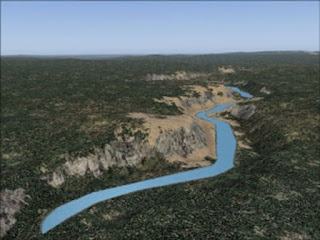
Egyptian Villages Fight Water War
Egyptian villages fight water war
by Staff Writers
Cairo (AFP) Aug 16, 2007
The land of the Nile is seeing a rising tide of protests at a shortage of drinking water amid accusations the government would rather irrigate golf courses than slake the thirst of villages.
A wave of demonstrations and ensuing clashes with police in recent weeks has left dozens injured in a country where the Nile River provides 95 percent of fresh water and irrigation uses up 80 percent of that.
The Arab world's most populous nation, with 76 million people, has a water deficit of 20 billion cubic metres (706 billion cubic feet) a year, according to government statistics.
Many inhabitants of the desert nation's villages are forced to resort to buying jerry cans of water from occasional tanker trucks or improvising wells to bring up often unclean water.
"Last week the tap water was yellow and smelled bad," said Nefertiti, 23, who lives in the Nile delta village of Borg el-Borollos, to the north of Cairo, declining to give her last name.
Water-borne illness, diarrhoea and dehydration are common in Egypt and "the thirsty," as the road-blocking protesters have been dubbed by the Egyptian press, say the government is doing nothing to end their plight.
Some accuse the government of prioritising water for the wealthy and for tourist destinations while villagers often have to pay water bills even when their taps are dry.
New, middle-class residential developments outside Cairo and the requisite golf courses and swimming pools further strain resources.
Faced with the mounting popular anger, Habitat Minister Ahmed al-Maghrabi announced the release of one billion Egyptian pounds (130 million euros/117 million dollars) in emergency measures to relieve those most affected.
New water pipes will be laid, around one hundred purification plants built and 500 wells dug in a country where many villages have not had running water for months or even years.
"Medium-term measures seem to be adequate, but they're not going to solve the immediate problems," said Hamdi al-Sayyad, president of the doctors' syndicate.
Egypt's water war, he said, is going to take years to resolve and, by then, new problems will have arisen.
End of excerpt.
~~~~~
This is absolutely insane. 80% wasted in irrigation when there are currently methods available to save water in this process? It is the same story we hear about in countless places around the world. Overpopulation and waste is leading the world to a moral reckoning. And as per this article, political indifference in order to make profits and exclude the poor is also a common tale. This then does not just entail laying new infrastructure, it entails the government of Egypt working with its citizens to provide family planning to stem the tide of new births that is putting pressure on existing resources if there is not a way to use them more conservatively, wisely, and equitably.
Our Earth as she stands now is finding it more and more difficult to sustain us with the finite reources she has in balance to the infinite number of ways we continue to find to despoil her. And what we are seeing now in all areas of the world is a lack of planning and moral will by people to do what is right by her over what is convenient for themselves, and that is a formula for disaster.
I also see this as a class war of sorts. It always is the poor who must suffer from the policies of the rich and where it concerns water it is a human rights abuse in my view. It is then good to see that the Habitat Minister has designated funds to dig wells, lay pipes, and do what is necessary to bring water to the people in need of it. However, this will not be the end as population increases, waste continues, and climate change makes itself evermore prevalent in this area of the world. And in an arid land such as Egypt, such waste is most definitely deadly.
More information on the history of Egypt's water woes:
Taming The Nile's Serpents
The Nile is looked upon as sacred and fearsome to the people in Ethiopia and that is something that has in turn hurt their existence as they only use 2% of the water available to them. This is a fascinating account of a trip down the Blue Nile posted by National Geographic, and to me brings out a point regarding water scarcity in areas where the water is sacred. Would people choose to use the water for their sustinence when faced with a true crisis, or would they choose to die to protect the sacred waters? And if this river is so sacred, why is it being so polluted? Like the Ganges River In India which is also considered sacred by its people, it is however one of the most polluted waterways in the world. This is where ancient traditions clash with modern reality.
The Blue Nile
My other entry on states working to share the Nile from last year:
African States Work To Share Nile



No comments:
Post a Comment